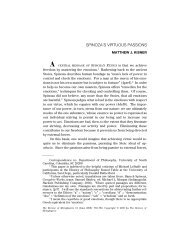heidegger's being and time and national socialism - Philosophy ...
heidegger's being and time and national socialism - Philosophy ...
heidegger's being and time and national socialism - Philosophy ...
Create successful ePaper yourself
Turn your PDF publications into a flip-book with our unique Google optimized e-Paper software.
PHILOSOPHY TODAY<br />
280<br />
uses the same vocabulary as Scheler does in the same<br />
context; see Fritsche, Historical Destiny <strong>and</strong> National<br />
Socialism, 113 (“principle of summation”). In<br />
other words, he equates <strong>being</strong>-with-other-Dasein<br />
<strong>and</strong> community; or, he identifies the fourth mode of<br />
solicitude—the one before liberalism—<strong>and</strong> community.<br />
In the following sentences, he summarizes his<br />
theory of the deficient mode of solicitude, <strong>and</strong> elaborates<br />
the commonplace of the then “communitarians”<br />
regarding society, namely, that it is nothing<br />
more than the sum of its parts, the subjects, <strong>and</strong><br />
emerges when the individuals relate to the other as<br />
means within a calculus of maximizing utility or<br />
profit. Heidegger uses here <strong>and</strong>, as quoted in the<br />
body of the text, in his characterizations of the<br />
inauthentic underst<strong>and</strong>ing of the call of conscience<br />
frequently the word rechnen—again, just a repetition<br />
of a term of Scheler’s, Rechenhaftigkeit, which<br />
Scheler uses in his anti-Semitic theory of the genesis<br />
of capitalism <strong>and</strong> of the Jewish “vital type” (see ibid.,<br />
118 <strong>and</strong> context). As was said, Hegel takes seriously<br />
the universalist promise of classic liberalism <strong>and</strong> arrives<br />
at a liberal justification of social welfare while<br />
Heidegger opposes social welfare. In the last quote,<br />
rechnen st<strong>and</strong>s for the rationality of maximizing utility,<br />
auf jem<strong>and</strong>en zählen is an everyday phrase expressing<br />
trust, reliance, or, politically, solidarity, <strong>and</strong><br />
the last expression an everyday phrase through<br />
which, say, bourgeois individuals or white-collar<br />
workers distance themselves from blue-collar workers.<br />
Heidegger repeats in the last quote a rightist<br />
commonplace on capitalism <strong>and</strong> in the first quote a<br />
rightist commonplace on Kant. He does not give any<br />
justification for his claim regarding Kant. Correspondingly,<br />
he has, as in contrast to Habermas, obviously<br />
no interest in explicating the different types of<br />
rationality at work in the different spheres of arithmetical<br />
justice in modern societies. To say that<br />
Heidegger criticizes Kant for reducing ethics to<br />
readiness-to-h<strong>and</strong> does not contradict my claim that<br />
readiness-to-h<strong>and</strong> is in the first place a matter of the<br />
fourth mode of solicitude, the one before liberalism,<br />
the one related to community. For Heidegger criticizes<br />
a category mistake or the supposed “original<br />
sin” of modernity. In addition, as the quotes in this<br />
note show, he obviously has in mind the deficient<br />
mode of readiness-to-h<strong>and</strong>, the one practiced in liberalism<br />
<strong>and</strong> modern technology (see above, n. 66).<br />
Most probably, when talking about Kant he had in<br />
mind Aristotle’s claim in Politics I that matters of the<br />
household are not part of the city. In other words, one<br />
has here a constitutive part of Hannah Arendt’s theory<br />
of the political.<br />
100. Heidegger, Being <strong>and</strong> Time, 321–22, 334, 342–43,<br />
344–45; Sein und Zeit, 276–77, 288, 296, 298.<br />
101. Heidegger, Being <strong>and</strong> Time, 342; Sein und Zeit, 296.<br />
102. “Dasein’s resoluteness towards itself is what first<br />
makes it possible to let the Others who are with it ‘be’<br />
in their ownmost potentiality-for-Being, <strong>and</strong> to codisclose<br />
this potentiality in the solicitude which<br />
leaps forth <strong>and</strong> liberates [vorspringend-befreienden<br />
Fürsorge]. When Dasein is resolute, it can become<br />
the ‘conscience’of Others. Only by authentically Being-their-Selves<br />
in resoluteness can people authentically<br />
be with one another—not by ambiguous <strong>and</strong><br />
jealous stipulations <strong>and</strong> talkative fraternizing in the<br />
‘they’ <strong>and</strong> what ‘they’ want to undertake”<br />
(Heidegger, Being <strong>and</strong> Time, 344–45; Sein und Zeit,<br />
298; the second positive mode “leaps ahead<br />
[vorausspringt] of” the Other <strong>and</strong> “frees the Other in<br />
his freedom for himself,” Being <strong>and</strong> Time, 158–59;<br />
Sein und Zeit, 122). In the last sentence Heidegger<br />
rejects in the name of his rightist notion of solidarity<br />
the liberal notion of consensus <strong>and</strong> contract <strong>and</strong> the<br />
leftist notion of solidarity (see Historical Destiny<br />
<strong>and</strong> National Socialism, 275–76n25).<br />
103. Heidegger, Being <strong>and</strong> Time, 325–26, see 312–13,<br />
337; Sein und Zeit, 280, see 268, 291.<br />
104. Heidegger, Being <strong>and</strong> Time, 378; Sein und Zeit, 329.<br />
105. Heidegger, Being <strong>and</strong> Time, 373; Sein und Zeit, 325.<br />
It is a pity that, in §65, Heidegger did not discuss the<br />
issue of the two temporalities independent of the issue<br />
of authenticity <strong>and</strong> primordiality. In “Ousia <strong>and</strong><br />
Gramme: Note on a Note from Being <strong>and</strong> Time”<br />
Jacques Derrida writes: “Now, is not the opposition<br />
of the primordial to the derivative still metaphysical?<br />
Is not the quest for an archia in general, no matter<br />
with what precautions one surrounds the concept,<br />
still the ‘essential’ operation of metaphysics? Supposing,<br />
despite powerful presumptions, that one may<br />
eliminate it from any other provenance, is there not at<br />
least some Platonism in the Verfallen? Why determine<br />
as fall the passage from one temporality to another?<br />
And why qualify temporality as authentic—or<br />
proper (eigentlich)—<strong>and</strong> as inauthentic—or improper<br />
when every ethical preoccupation has been<br />
suspended?” Margins of <strong>Philosophy</strong>, trans. by Alan<br />
Bass (Chicago: University of Chicago Press,<br />
1982), 63. Derrida could not overlook the metaphysical<br />
character of crucial elements of Being <strong>and</strong> Time<br />
also because a few years earlier, in Of Gramma-
















